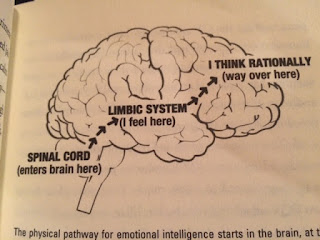It's timely that my employer has required me to read Emotional Intelligence 2.0* and take the assessment for a conference I have to attend next week. Knowing your emotional intelligence (EQ) and emotional triggers can help you avoid letting your emotions hijack rational thought.
These hijackings occur because our brain responds to external stimuli emotionally first before processing rationally:
I experience emotions way too intensely for my own good, frequently repress them in order to give a calm, cool, collected face to the world, and then eventually explode when the right stimulus presents itself.
Trigger: The realization that a goal I've been trying to achieve for six months... no, much longer than that... is still out of reach.
Emotional Response: Depression. Heartbreak. Fury.
Rational Thought: I don't know. It's taking a really long time for all of this to get past my limbic system.
So I took the online EQ assessment to see what might help. And laughed when I got the result:
From the pages on self-talk:
Much of the time, your self-talk is positive and it helps you through your day.... Your self-talk damages your ability to self-manage anytime it becomes negative. Negative self-talk is unrealistic and self-defeating. It can send you into a downward emotional spiral that makes it difficult to get what you want in life.
So how will I stop engaging in negative self-talk? The strategies recommended by the book include:
- Turn "I always" or "I never" into "just this time" or "sometimes". This is probably easiest to do for my current situation. "I never reach my goals" isn't appropriate to say here - maybe "I'm not going to reach my half marathon goal this time." No, still doesn't make me feel better.
- Replace judgmental statements with factual ones. So rather than say "I suck at running," I could say "There are things I still need to work on to become a better runner."
- Accept responsibility for your actions and no one else's. This one's tougher to apply. I'm still not sure what I should have done differently to be in a better spot today than where I am for my race. But going forward, I can continue to read, learn, and grow to achieve the best possible outcome I can in one month's time.
Today's exercise: Rest. My left hip has been bothering me, hoping it is something that will pass quickly.




No comments:
Post a Comment